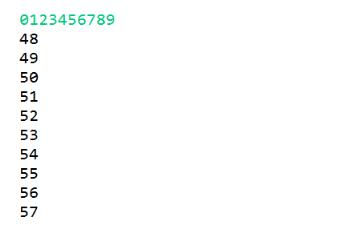Java中输出字符的ASCII值实例
本文向大家介绍Java中输出字符的ASCII值实例,包括了Java中输出字符的ASCII值实例的使用技巧和注意事项,需要的朋友参考一下
1. 我们可以通过将字符强转为int型进行输出那么在控制台中我们将会得到字符的ascii值,这里我们使用nextLine()方法来接收字符串,可以接收空格/Tab键,使用next()方法则不会接收空格/Tab键,但是这里使用nextLine方法不能打印回车键的ascii值因为它遇到回车键就截止接收字符了
2. 具体的测试代码如下:
import java.util.Scanner;
public class Main {
public static void main(String[] args) {
Scanner sc = new Scanner(System.in);
String s = sc.nextLine();
for(int i = 0; i < s.length(); i++){
System.out.println((int)s.charAt(i));
}
sc.close();
}
}
输入:
0123456789
输出:

补充知识:Java Integer -128~127
今天刷到了一道题,为什么第一个为true,第二个为false。
System.out.println(Integer.valueOf("100")==Integer.valueOf("100")); //true
System.out.println(Integer.valueOf("200")==Integer.valueOf("200")); //false
研究源码发现
/**
* Returns a <tt>Integer</tt> instance representing the specified
* <tt>int</tt> value.
* If a new <tt>Integer</tt> instance is not required, this method
* should generally be used in preference to the constructor
* {@link #Integer(int)}, as this method is likely to yield
* significantly better space and time performance by caching
* frequently requested values.
*
* @param i an <code>int</code> value.
* @return a <tt>Integer</tt> instance representing <tt>i</tt>.
* @since 1.5
*/
public static Integer valueOf(int i) {
if(i >= -128 && i <= IntegerCache.high)
return IntegerCache.cache[i + 128];
else
return new Integer(i);
}
private static class IntegerCache {
static final int high;
static final Integer cache[];
static {
final int low = -128;
// high value may be configured by property
int h = 127;
if (integerCacheHighPropValue != null) {
// Use Long.decode here to avoid invoking methods that
// require Integer's autoboxing cache to be initialized
int i = Long.decode(integerCacheHighPropValue).intValue();
i = Math.max(i, 127);
// Maximum array size is Integer.MAX_VALUE
h = Math.min(i, Integer.MAX_VALUE - -low);
}
high = h;
cache = new Integer[(high - low) + 1];
int j = low;
for(int k = 0; k < cache.length; k++)
cache[k] = new Integer(j++);
}
private IntegerCache() {}
}
valueOf会将常用的值(-128 to 127)cache起来。当i值在这个范围时,会比用构造方法Integer(int)效率和空间上更好。
以上这篇Java中输出字符的ASCII值实例就是小编分享给大家的全部内容了,希望能给大家一个参考,也希望大家多多支持呐喊教程。
声明:本文内容来源于网络,版权归原作者所有,内容由互联网用户自发贡献自行上传,本网站不拥有所有权,未作人工编辑处理,也不承担相关法律责任。如果您发现有涉嫌版权的内容,欢迎发送邮件至:notice#yiidian.com(发邮件时,请将#更换为@)进行举报,并提供相关证据,一经查实,本站将立刻删除涉嫌侵权内容。

